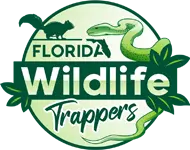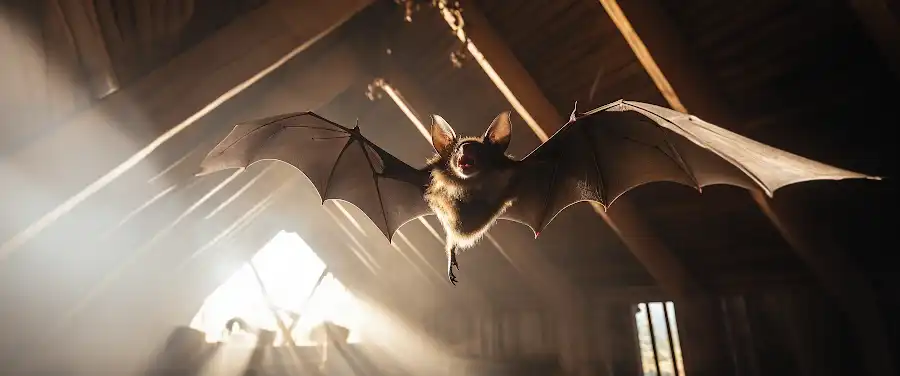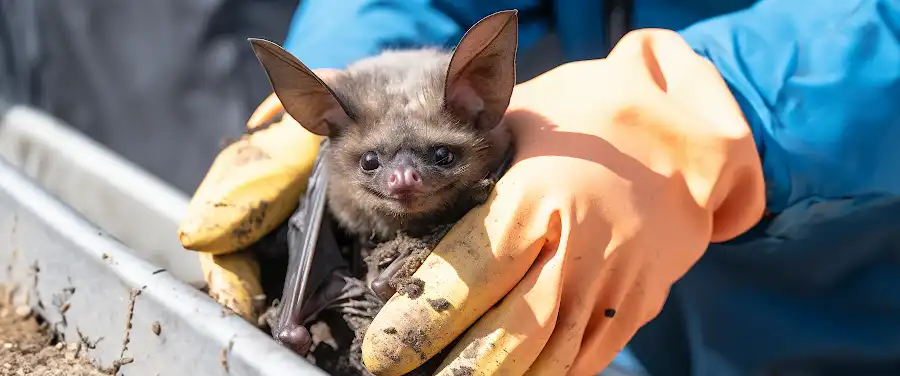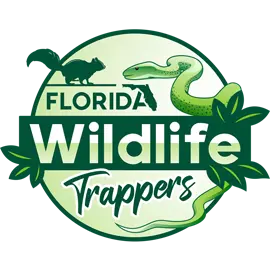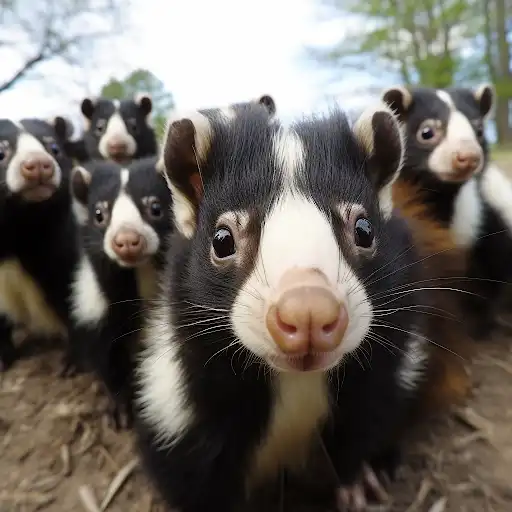
Ah, skunks – the striking black and white creatures whose notorious reputation often eclipses their interesting qualities and importance to our ecosystem. When one thinks of skunks, it’s usually about the sticky, pungent spray they release when they feel threatened, not about their beneficial role as nature’s pest control. But what if we were to shift that perception? As residents of Central Florida, can we foster a more compassionate understanding for these misunderstood critters and learn to cohabit peacefully?
Foremost, it’s crucial we grasp that living in harmony with our surrounding wildlife, skunks included, begins with understanding their behavior, their needs, and their crucial role in our ecosystems. Skunks, just like every other organism, are a key link in the large, interconnected web of life. They play a significant role in controlling bothersome insects and small rodents. You see, by removing these pests, skunks actually help maintain a balanced and healthy environment. Understanding skunks is our first step towards a harmonious coexistence.
Breaking down the common misconceptions about skunks and informing about their humane removal is not only essential for our peaceful cohabitation but it’s also a humane approach that respects all forms of life. As you dive deeper into this article, remember that fostering a sense of respect and compassion for our co-inhabitants on this planet begins with understanding – and that’s what we aim to explore today. All set? Excellent. Up next, let’s delve into some nitty-gritty details – just what exactly are skunks?
Why do Skunks Spray? – The Defense Mechanism of Skunks’ Spraying
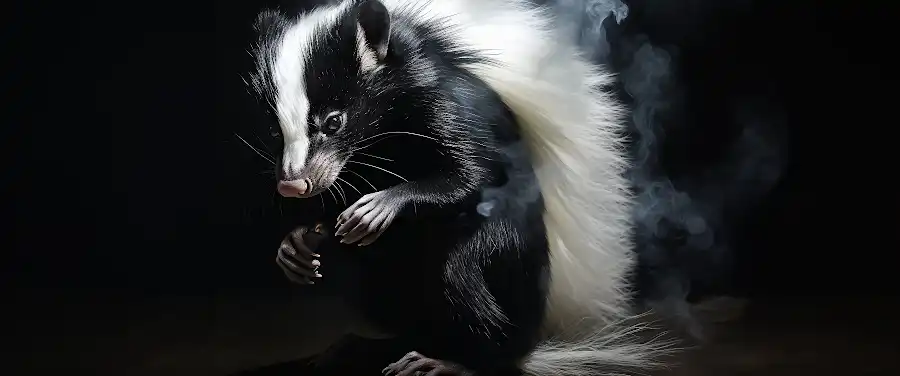
Among the many unique creatures of the animal kingdom, skunks stand out with a rather potent defense mechanism – their notorious spray. So, why do skunks spray? Understanding skunks is not just about their black and white fur patterns and burrowing habits, but also about their unique ability to spray. The fact is, skunks rely on their spray as a last-ditch defense against threats, hence its potent nature. Let’s take a deeper dive into this peculiar habit of our furry friends!
Situations That May Provoke Skunks to Spray
Skunks spray when they feel threatened or alarmed. A dog’s barking, human presence, or another predator may trigger this mechanism. The trigger of a skunk’s spray is inherently associated with fear or danger. Remarkably, skunks don’t resort to spraying readily – they would much rather retreat. This strong-smelling spray is their last line of defense when they’re cornered and cannot find an escape route.
Effect of Skunk’s Spray on Humans and Animals
The effect of a skunk’s spray on humans and animals is quite intense. For humans, it can cause nausea, vomiting, and even temporary blindness. Pets and other animals may experience similar symptoms. Depending on the exposure, the smell can linger for weeks. But is it fatal? It rarely is, but we still highly recommend avoiding direct contact with a skunk’s spray. The National Park Service confirms these facts and provides some useful tips on dealing with skunks safely and humanely.
Understanding skunks goes beyond just knowing when and why they spray. It helps us respect their presence, boundaries, and peculiar defense mechanisms. In the end, despite their infamous reputation, skunks play a vital role in the ecosystem, controlling pests and maintaining the balance.
As we wrap up this discussion on skunks’ defense mechanism, it’s time to transition to our next topic of interest– “Is It Safe to Live Near Skunks?” Let’s dispel some myths and share insights on how we can peacefully coexist with these unique creatures.
Is It Safe to Live Near Skunks?
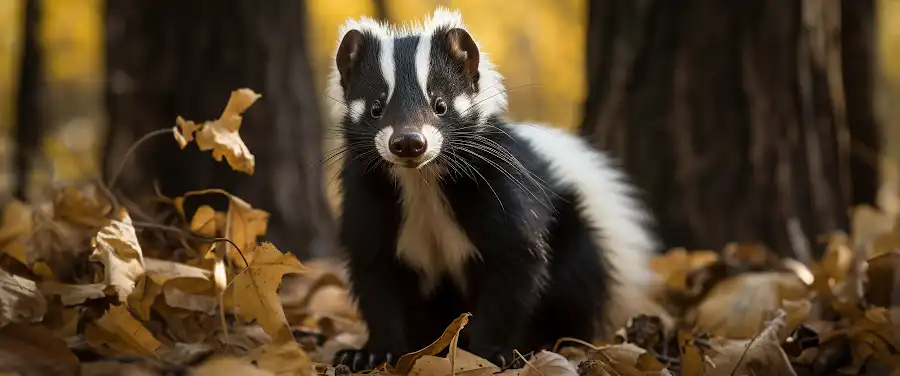
Living close to nature can bring a sense of tranquility to our lives. However, when that nature includes skunks, this peaceful interaction might not always be as idyllic as we would like.
In Central Florida, the interaction between humans and skunks is part of daily life, and although skunks are mostly harmless, there are a few things that need to be kept in mind. So, what is it about skunks that can be a concern to us?
Diseases and Health Risks Associated with Skunks
Skunks, like any other wild animal, carry a range of diseases that could pose a health risk to humans and pets. The key to understanding skunks is to note that they can be carriers of diseases like rabies and leptospirosis. While these diseases are not commonly contracted from skunks, they still pose a risk if proper precautions are not taken.
According to a Centers for Disease Control and Prevention report, skunks are one of the primary carriers of rabies in the U.S.
Here is a list of potential diseases linked to skunks:
- 1Rabies
- 2Leptospirosis
- 3Canine Distemper
- 4Tularemia
Skunks Impact on Property and Gardens
While skunks are not inherently destructive animals, their instinctive behaviors can unintentionally cause damage around your property. These animals are notorious for burrowing under structures and digging in gardens in search of food. These activities may result in substantial damage to your landscaping.
| Effects of Skunks | Description |
|---|---|
| Property Damage | Skunks can burrow under houses, decks, sheds, and other structures, potentially causing foundational damage. |
| Garden Damage | Skunks dig around gardens and lawns to hunt for grubs and other food sources. This can lead to significant damage to plants, lawns, and sprinkler systems. |
| Odor Issues | The infamous skunk spray can cause persistent and unpleasant odors that are difficult to eliminate. |
| Disease Transmission | Skunks can transmit diseases to pets and humans, as discussed earlier. |
Though skunks may pose certain challenges, with precautionary measures taken, it is feasible to coexist. But remember, should you encounter a skunk, respect its space and give it the opportunity to retreat. The better we understand these creatures, the more harmonious our cohabitation can be.
On the next topic, we will look into the effective ways to deter skunks from your property. Be sure to follow along as we delve into practical techniques to reduce your skunk encounters.
How to Deter Skunks from Your Property?
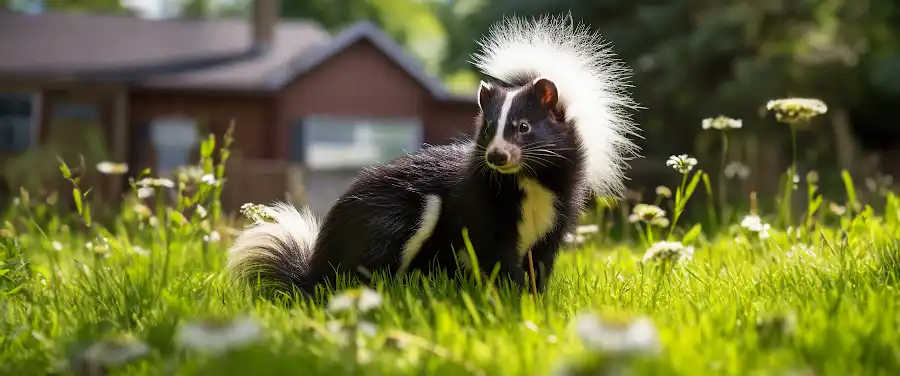
When it comes to understanding skunks it’s crucial to know that they are creatures of habit and convenience. Skunks, like most wildlife, are drawn to areas that provide easy access to food, water, and shelter. Thus, the first step in deterring skunks from your Central Florida property is to make it as inhospitable as possible. Let’s dive deeper into the skunk deterrent methods that you can easily utilise.
Secure Your Food Sources
Skunks are omnivorous, meaning they eat a mix of plants and meat. Consequently, anything from your pet’s leftover dinner to the fruits fallen off your backyard trees can be a feast for them. The most effective way to deter skunks from your property is to secure all potential food sources. Here are a few practical steps that often help:
- Keep pet food indoors, especially at night when skunks are most active.
- Secure lids on garbage cans and compost bins.
- Clean up fallen fruit or nuts from your yard promptly.
Remember, if there’s nothing to eat, the skunks will move on!
Make Your Property Unattractive to Skunks
Just eliminating food sources may not be enough. You should aim to take measures to skunk-proof your property. Here’s how:
- Remove potential hiding spots. Skunks prefer to nest in quiet, dim, enclosed spaces. Clear out brush, logs, and debris from your property to eliminate their potential homes.
- Install a tight fencing around your garden or yard. Skunks are poor climbers and diggers, so this can be very effective.
- Using repellants. There are various skunk repellents available, some spices and herbs have shown promising results. Bright lights and noise can also deter skunks, as they prefer darkness and calmness.
But remember, you must apply these methods consistently and be patient. Skunks are stubborn creatures and it might take a while before they decide to find a new home.
For a more in-depth guide, visit the Humane Society’s Website for tips on how to deal with a skunk problem.
The journey of understanding skunks and how to deal with them doesn’t stop here. Now, you may wonder, “How can I tell if the skunks have already moved in? Let’s explore this in the next section, ” How to Identify a Skunk Infestation?”
With knowledge and consistency, you can successfully implement these skunk deterrent methods and keep your property skunk-free!
Remember, the key to living peacefully with these distinctive creatures is all about understanding skunks and their habits. Therefore, it’s essential to educate, enact, and enforce these preventative measures–a principle for a humane approach to wildlife issues.
Understanding Skunks: Identifying Skunk Infestation in Central Florida
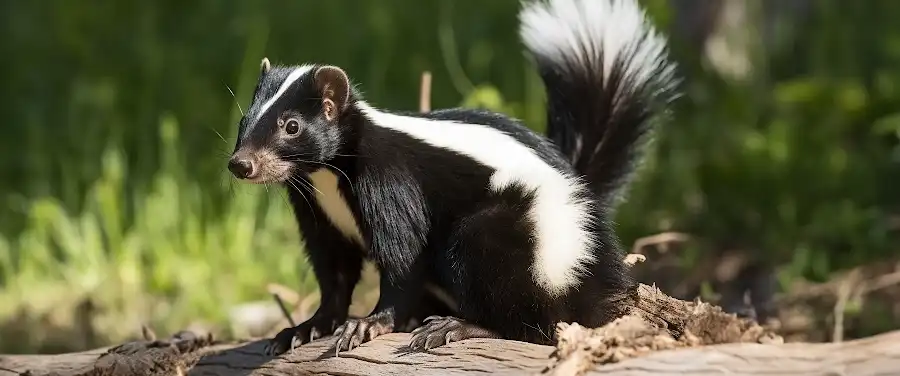
It doesn’t take a wildlife expert to know when skunks have paid a visit. Their signature scent is a sure sign, but there are other ways to confirm if you’re dealing with a skunk infestation. Here in Central Florida, understanding skunks goes beyond their notorious odor. So, how do we determine if skunks have taken up residence in our neighborhoods or backyards?
Identifying Skunks by Sight and Smell
One obvious way to know you’re dealing with a skunk is, of course, catching sight of one. They’re relatively easy to identify with their black fur and distinctive white stripes. However, even without a direct sighting, another tell-tale sign is their pungent odor. Skunks release a potent scent as a defense mechanism, and if you’ve been unfortunate enough to experience this musky spray, you’ll understand why it’s such a deterrent!
Skunk Infestation Signs
However, sometimes the presence of skunks isn’t quite so obvious. This is where recognizing skunk infestation signs can be useful. The presence of small holes in your lawn or garden, about 3 to 4 inches in diameter, might indicate a skunk’s search for insects. Skunks might also leave behind distinctive tracks which are similar to those of a cat but with five toes on each foot.
Furthermore, skunks are burrowers, often making homes under buildings, decks, or sheds. If you’re noticing disruptions to these structures or finding entrances and exits around your property, you’re likely dealing with a skunk infestation.
Finally, skunks are nocturnal, so you might not spot them during the day. Instead, you could hear them moving around at night, particularly if they’ve taken up residence under your house.
A Special Note: Baby Skunks in Breeding Season
An extra consideration in understanding skunks lies in their breeding season, typically occurring in the spring in Central Florida. During this period, you might spot baby skunks, known as kits. They can be even more mischievous and nosy than their mature counterparts, resulting in unexpected encounters. It’s essential to proceed with caution around them.
Remember, recognizing these signs early is crucial in preventing extensive damage and frustration. For a comprehensive guide on dealing with skunks, you can visit this official Florida Wildlife Control page.
Now that you’re well-equipped with the basics of identifying skunks and their activity, the next question is, what do you do when a skunk sprays? Prepare yourself, because that’s exactly what we’re going to explore in the following section. The foul stench of a skunk’s spray is legendary, and we’re about to venture into how to manage and mitigate it!
What to Do if a Skunk Sprays?
The unexpected encounter with a skunk can be less than pleasant, especially if they decided to deploy their notorious defense mechanism – the aromatic skunk spray. The skunk spray—an oily liquid produced in the anal glands of the skunk—can be incredibly difficult to remove and has an excruciatingly horrible smell. So, what should you do in the unfortunate event that you or your pet has been sprayed by a skunk?
Immediate steps after a skunk sprays
The first thing you should do is avoid panic. Stay calm and remember the following steps. Time matters as the longer the skunk oil sits on skin or fur, the harder it becomes to remove. Leave the contaminated area to avoid further exposure and immediately begin treatment.
- Put on disposable gloves.
- If dealing with a pet, try to keep them outside to prevent the smell from infiltrating the entire house.
- Remove any clothing that has been sprayed.
Remedies to Neutralize the Smell of Skunk Spray
There are several methods to neutralize the smell of skunk spray—from homemade concoctions and commercial products to professional cleaning services. Use below table as a quick reference for your skunk ordeal.
| Home Remedies | Commercial Products |
|---|---|
| Mix hydrogen peroxide, baking soda and dish soap | Buy a commercial skunk smell remover |
| Tomato juice bath (although results may vary) | Skunk-Off, Nature’s Miracle Skunk Odor Remover |
When to Seek Medical Attention
Most skunk encounters end with nothing more than a bad smell. However, it’s crucial to seek medical attention for skunk spray in certain situations.
- If the skunk spray gets into your eyes, rinse them out immediately. The spray can cause temporary blindness. If pain persists, consult an eye doctor.
- If you or your pet are bitten by a skunk, seek immediate medical or veterinary help respectively. Skunks can be carriers of rabies.
Final Thoughts on Skunk Spray
Skunks remain a common yet misunderstood part of Central Florida’s wildlife. Armed with the right knowledge, you can successfully handle an unfortunate spray situation, and understand the importance of maintaining a respectful distance from these animals. After taking in all this insightful information, you should now be better equipped for potential encounters with skunks.
In the end, remember that skunks are just as important to our ecosystem as any other critter. Hence, it is necessary to deal with them in a humane way. So, how do you remove a skunk that’s decided to take residence in your premises without harming it? On this note, let’s smoothly transition to our next topic: ” Humane Removal of Skunks”.
Humane Removal of Skunks – Laws Surrounding Skunk Removal
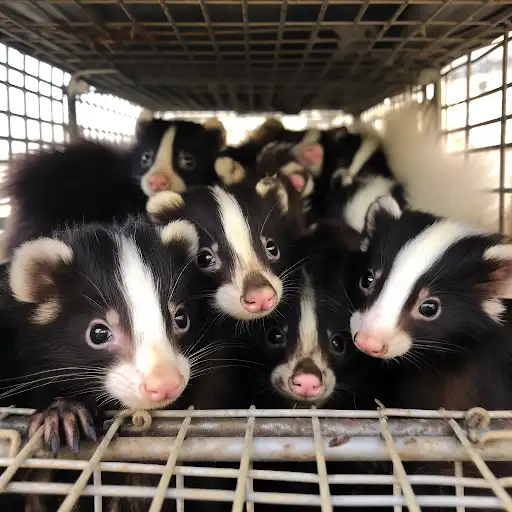
Pondering if you can rattle off the laws regarding skunk removal in the sunny confines of central Florida? Or, are you contemplating a DIY skunk removal and wondering if you can go toe-to-toe with these alluringly odorous critters? Here’s a little enlightenment for you!
In the state of Florida, there are explicit laws governing the humane removal of skunks. According to Florida Administrative Code (FAC) 68A-9.010, wild animals (skunks included) may be taken using live traps, but they must be returned on the same contiguous property or euthanized. This means you can’t, willy-nilly, displace that skunk to a random location miles away from your property.
Consequently, if you lack the technical know-how to humanely euthanize the skunk or return it within your enormous property – it’s time to call a professional skunk removal specialist. They are familiar with local laws and can avoid causing undue stress or harm to the animal. Additionally, professionals have the appropriate equipment, training, and permits.
Now, let’s compare DIY skunk removal alternatives and professional removal techniques.
DIY Skunk Removal vs. Professional Removal Methods
| DIY Skunk Removal | Professional Skunk Removal | |
|---|---|---|
| Effectiveness | Variable | Guaranteed |
| Safety Measures | Potentially Compromised | Always upheld |
| Familiarity with Skunk Behavior | Inadequate | Comprehensive |
| Legal Compliance | Uncertain | Always compliant |
| Humane Handling | Unassured | Always humane |
It’s clear why opting for a professional skunk removal service might be the safer and more effective route!
As per a report from National Geographic, out of every 10,000 cases of rabies reported annually in the U.S, between two to four people contract the disease from skunks—a statistic that further justifies why relying on a professional is a wise decision.
Rounding off our insights on skunk removal, remember, the goals are ensuring humane handling while strict adherence to your region’s laws. Now, let’s shift gears and explore how we can usher a ceasefire with these petite black-and-white critters by living harmoniously with skunks.
| Home Remedies | Commercial Products |
|---|---|
| Mix hydrogen peroxide, baking soda and dish soap | Buy a commercial skunk smell remover |
| Tomato juice bath (although results may vary) | Skunk-Off, Nature’s Miracle Skunk Odor Remover |
Conclusion
If you’ve experienced an encounter with a black and white furry critter that left you wrinkling your nose, you aren’t alone. Welcome to the world of understanding skunks, a unique animal known for their potent and repellent scent. Skunks may not be everyone’s favorite creature due to their infamous odor, but there’s a lot more to these animals than you may realize. Let’s take a closer look at these often misunderstood mammals, and discover how to coexist with them, and remove them humanely if need be.
Basics of Understanding Skunks
Skunks are mostly nocturnal mammals that can be both beneficial and disruptive to humans. Their diet consists mainly of pests such as grubs, bugs, and small rodents, which makes them useful in controlling certain pests around homes and gardens. But they’re also known for digging up lawns and spraying their foul-smelling musk when threatened, which can be quite unpleasant.
Skunks are not naturally aggressive, but they will defend themselves if they feel threatened. This usually involves spraying the offending party with a strong-smelling musk, which can be very difficult to eliminate.
In Florida, the most prevalent species is the striped skunk, easily recognizable by the wide, white stripe that runs along its back.
Living Harmoniously with Skunks
Given their beneficial role in controlling pests, coexistence is often the best option when it comes to dealing with skunks. A few changes can make your home less appealing to skunks and discourage them from taking up residence there.
- Make sure trash cans are securely closed, as skunks are drawn to food garbage.
- Avoid feeding pets outside whenever possible, as leftover food may attract skunks.
- Close off any possible hiding spots such as under decks or sheds where they could establish dens.
Humane Removal of Skunks
If skunks have already set up home on your property, humane removal is the best approach. This involves diagnosing the issue, removing the skunks without harming them, and taking precautions to prevent future issues. This is best conducted by a professional for obvious (and smelly) reasons.
To conclude, understanding skunks mean recognizing the essential role they play in our ecosystem while also acknowledging the challenges they might present. By choosing to coexist harmoniously and opting for humane removal practices, we ensure the survival of these unique creatures while still maintaining our comfort.
Always remember, skunks are an important part of our wildlife in Central Florida, they have a place in our environment. They are more than just the carriers of a stinging odor; they are a natural pest control method. With a little understanding, there is every possibility for a peaceful coexistence.
Frequently Asked Questions about How Rodents Can Damage Your Property
Table of Contents
- Why do Skunks Spray? – The Defense Mechanism of Skunks’ Spraying
- Is It Safe to Live Near Skunks?
- How to Deter Skunks from Your Property?
- Understanding Skunks: Identifying Skunk Infestation in Central Florida
- What to Do if a Skunk Sprays?
- Humane Removal of Skunks – Laws Surrounding Skunk Removal
- Conclusion
- Frequently Asked Questions about How Rodents Can Damage Your Property
